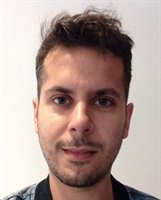Kalantzis awarded the 2020 SIAM Student Paper Prize


The Society for Industrial and Applied Mathematics (SIAM) selected former Ph.D. student Vasileios Kalantzis’ paper “Beyond Automated Multilevel Substructuring: Domain Decomposition with Rational Filtering” for the 2020 SIAM Student Paper Prize.
He co-authored the paper with Yuanzhe Xi and Yousef Saad, which was published in SIAM Journal on Scientific Computing in 2018.
“It's a big honor and I am deeply grateful to SIAM for encouraging and promoting the contribution of students in our community,” shared Kalantzis. “On a personal level this award serves as an additional level of motivation to keep exploring and testing my ideas, and I am thankful to Yuanzhe Xi and Yousef Saad for their collaboration.”
The paper features a parallel numerical algorithm for the partial solution of large and sparse algebraic symmetric generalized eigenvalue problems. Large-scale eigenvalue computations can be found in many scientific disciplines, such as data mining, structural mechanics, and quantum mechanics. Creating faster and more efficient parallel algorithms allows researchers to run their simulations in less time, thus accelerating scientific discovery.
The SIAM Student Paper Prize recognizes outstanding scholarship by students in applied mathematics and computing as evidenced in a paper accepted for publication in a SIAM journal. The prize is awarded annually to up to three student authors of the most outstanding papers accepted by a SIAM journal within the three years preceding the nomination deadline. The award is based solely on the merit and content of the candidate’s contribution to the paper.
Kalantzis is a now Research Staff Member at IBM Research, Thomas J. Watson Research Center. He received his Ph.D. (2018) and M.S.C. (2016) in computer science and engineering from the University of Minnesota, both under the direction of Yousef Saad. Prior to that, he received a M.S.C. (2014) and a M.Eng. (2011) in computer engineering and informatics from the University of Patras in Greece. His current research interests are primarily in trusted artificial intelligence, numerical methods for quantum computing, and in-memory computing.